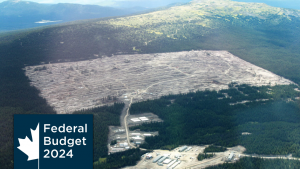B.C.’s economy is pulling ahead of the rest of Canada and construction is leading the charge.That’s the opinion of Business Council of British Columbia executive vice-president and economist Jock Finlayson, who was one of the keynote speakers at the Independent Contractors and Businesses Association’s 20th annual CEO breakfast, held at Buildex Vancouver.
"Construction is a long-term growth industry for B.C. with growth over a 15-year period at twice the pace of the economy," Finlayson said, though he cautioned non-residential construction is much weaker than residential work. "It’s not an exaggeration to say B.C. has a housing and construction-centric economy."
Jobs in the Lower Mainland are also "skyrocketing," he said, though most jobs in the province are concentrated in metro Vancouver and the Fraser Valley.
B.C. was also the strongest province in Canada in terms of overall growth in 2015-16 and real gross domestic product (GDP) was 2.9 per cent in 2016. Finlayson predicted the province’s GDP would slow to 2.2 per cent in 2017, and stay at that rate throughout 2018.
"This is based on a slowdown in lumber sales to the United States, along with a slowdown in retail sales and a slight decline in housing starts," he said.
He added though the council is supportive of future liquefied natural gas (LNG) projects, their forecast does not see any LNG projects going forward in the immediate future.
The future is less rosy at a national level. The decline of energy prices, Finlayson said, was a "tremendous kick to the shins to the Canadian economy," one which the nation is still recovering from in 2017.
Canada has adjusted through a flexible exchange rate and a "dovish" central bank, he said. A further constraint to growth is Canadian household debt, amongst the highest in the developed world.
"It’s not a crisis because of low interest rates, but if those rates did go up it would put quite a squeeze on people’s lifestyles," Finlayson said.
By far the greatest sense of uncertainty is on the international front, Finlayson said, both south of the border and globally.
"Renegotiation of NAFTA (the North American Free Trade Agreement) is a front and centre worry, as is the possibility of a deterioration in the global trade environment predicated by a U.S.-China trade war," Finlayson said.
"That would be bad for the world economy and for Canada."
Domestically, the current U.S. economy is a "strong handoff" to the new Trump administration, with some time to go in a multi-year expansion cycle and significant upside in the housing market, with housing starts rising and pent-up demand, unlike Canada.
"A lot of parents want their kids to get the hell out of their basements across America," Finlayson joked.
Trump and the GOP have a broad agenda of regulatory reform, increased infrastructure and defence spending, along with tax reform, he added.
While this would be good for the Canadian economy, he cautioned the U.S. is not known for implementing such plans rapidly.
Another potential benefit for Canada is the American shift in attitude towards immigration.
"The U.S. may become less welcoming to immigrants, legal or otherwise, which may mean benefits for Canada," he said.
But a new immigration policy could backfire for the Trump administration.
"The U.S. labour pool is very close to full employment and deporting illegal workers may actually impact the economy in a negative way," Finlayson said.
Tax reform south of the border could also adversely affect Canadian competiveness, as could changes in climate policy.
"It’s clear any climate change framework will be rejected by the Trump administration, while Canada will hew to climate change policy. This puts Canada at a disadvantage in terms of energy costs," he said.
"Trump has also vowed to slash the corporate tax rate, rendering the U.S. a more attractive place to put capital investment."











Recent Comments
comments for this post are closed